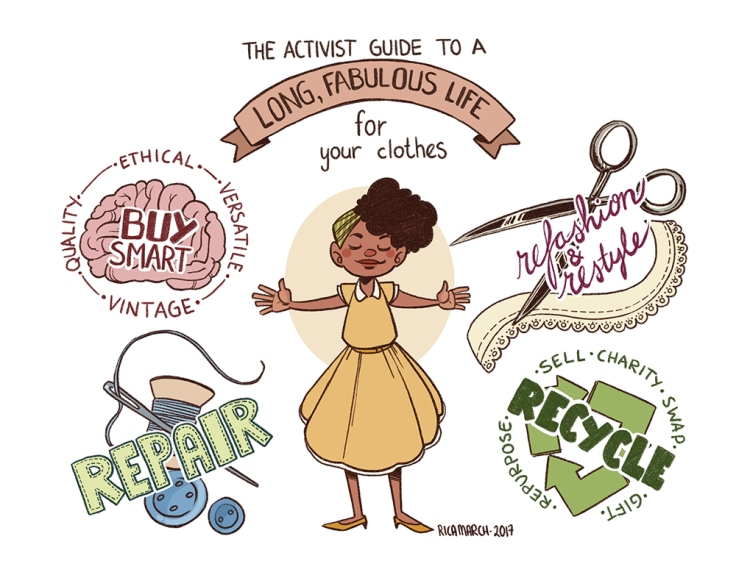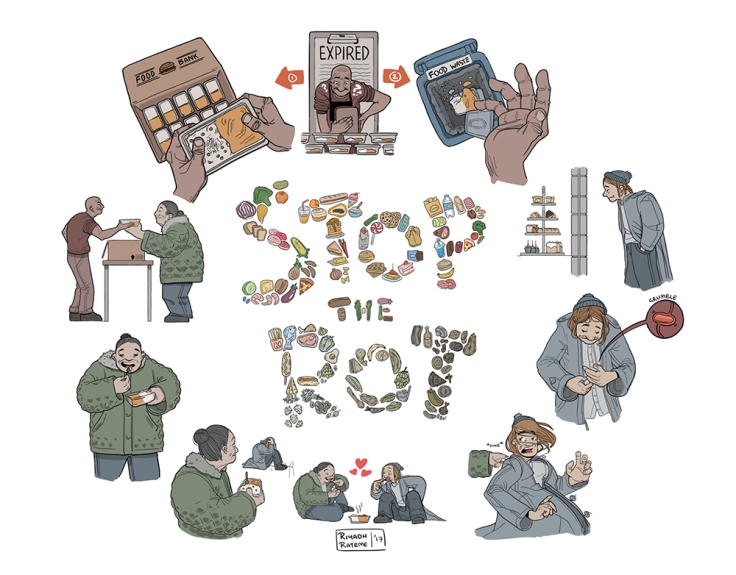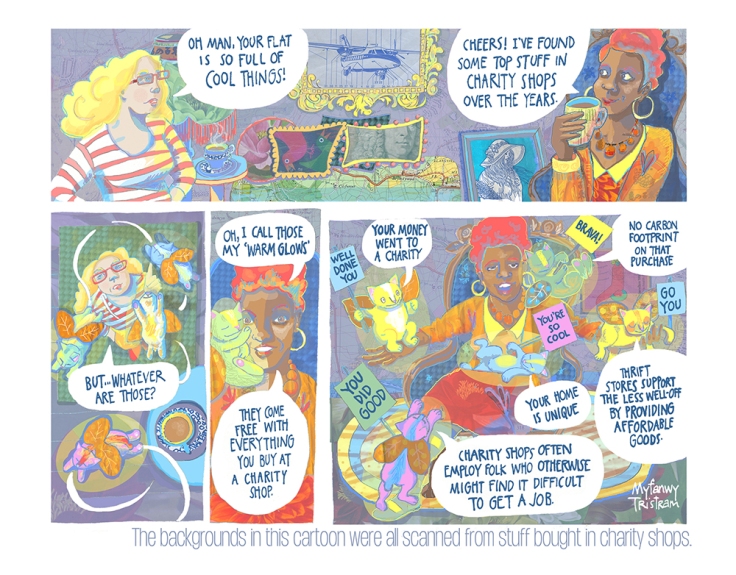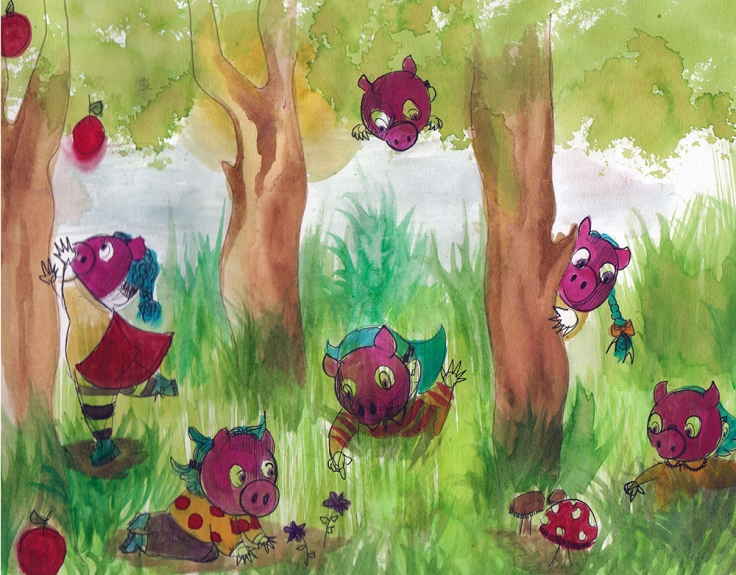We can do it, step by step. Here’s how to ensure we’re minimising our effect on the things that matter… like the entire planet.
Click any of the images to see them at a larger size.

PLANT RADICAL ROOTS
Start a community gardening project where everyone reaps what you sow together.
You’re growing cheap, healthy food, and at the same time, creating friendships, getting fresh air and exercise, improving mental health, and reducing the amount of fruit and veg that needs to travel half way round the world.
Image by Zara Slattery

GO SLOW
Fast fashion — the phenomenon of cheap highstreet shops churning out clothes that are only designed to last a season, cost almost nothing, and then end up in landfill — is bad for the environment.
“Clothes are the second largest source of pollution after oil,” according to the US organisation Opposing Views.
It’s very likely also bad for the people who make the clothes. Ask yourself how much the factory workers must be being paid, to be able to offer garments at such low prices. Then research the more ethical options and take your custom there.
Buy fewer items that are high quality and will last longer.
Image by Rica March

TRANSITION YOUR TOWN
Commit your town to increasing self-sufficiency to reduce the potential effects of peak oil, climate destruction, and economic instability.
Image by Dave Crane

GO REUSABLE
Convenience be hanged, every disposable razor, pen, coffee cup or carrier bag we buy is wasting resources, magnifying our carbon footprint, and going straight to landfill — not to mention the horrible chemicals that were probably involved in its making.
We’re all used to the canvas tote bag now — it’s time to research permanent, reusable alternatives for the other wasteful goods in our lives.
Image by Daniel Locke

GROW WILD
We depend on bees for many of our fruits and vegetables, but since 1945 the UK has lost 97% of it wildflower-rich meadows on which many species of bees depend.
Why not grow your own mini wildflower meadow or create a bee friendly habitat for your community, school or workplace?
If you have a space big enough, Friends of the Earth will provide kits and support to get you going and keep our world buzzing.
Image by Birta Thrastardottir

STOP THE ROT
Ask your local restaurants to donate their leftover food to the homeless — or like this bagel shop, turn it into beer!
Better still, see if there’s a set-up like the Real Junk Food Project which will collect waste food and turn it into meals for those who need it.
Image by Riyadh Rateme

ESCHEW THE NEW
Buy second hand. You’ll be benefiting a charity if it’s from a thrift store, or helping out the seller if you buy direct.
Either way, you’ll be circumventing big business and shrinking your carbon footprint.
Image by Myfanwy Tristram

EAT LESS MEAT
More people are recognising the serious impact of the meat industry on our planet.
Producing meat — especially beef — destroys forests to make way for grazing land, diverts scarce water resources and uses up resources to produce animal feed that could be used to grow vegetables and grains, feeding more people.
Cows’ burps also produce massive amounts of methane, a climate-changing gas twenty-five times more potent than carbon dioxide.
Eating less meat, or going vegetarian, can only be a good thing. Good for the planet, and good for you, too.
Image by Sarah Lippett

PLANT A TREE
The Woodland Trust gives eight reasons for planting a tree, from providing a habitat for the many creatures that live on, below and around them, to helping with flood defences.
In the UK, they’ll even provide trees for schools and communities, for free.
Image by Abigail Lingford

BE A TRUFFLE PIG
Even in the city foraging is a way to find great food. You’ll also get some exercise and fresh air, reconnect with the natural world and save money. Plus, it’s the ultimate in reducing your food-related carbon footprint.
Sign up for a foraging course to make sure you’re picking the right plants, though — we don’t want any poisonous toadstools in your dinner.
Image by EdieOP

LAYER UP
Instead of turning the heating on, put another layer on. Just like your mum told you.
Image by Danny Noble

LOOK TO YOUR BATHROOM
Environmental considerations be hanged; there are some things that just have to be disposable, right? No-one wants to use a cotton bud or toilet paper more than once, for example.
But you can still seek out less environmentally-damaging products, like paper cotton buds, or unbleached and recycled loo rolls.
As for sanitary products, well, that’s somewhere that there *are* reusable options, but if you can’t use them for whatever reason, the same applies: look for brands that don’t wrap each item in plastic, which use unbleached paper, and are composed of certified materials.
Image by Jo Harrison

DONATE YOUR WASTE GOODS
If your car is only good for scrap or your phone is due for an upgrade, there are services which will take them off your hands and donate any proceeds to the charity of your choice.
Image by Paul Shinn

SHARE YOUR EXPERIENCES
Trying to make a better world?
Write a blog as you go about it. Sharing your experiences with the world sets a precedent, and normalises them for the next person thinking of doing the same.
Image by Richy K. Chandler

HAVE YOUR DAY IN COURT
Your government should serve you. If you believe they have gone so badly astray from this path that they are doing actual harm, there is recourse: you can take them to court.
Yes, it takes guts; it takes money too. But it may just save the world. In the US, for example, kids are suing the government over climate change.
Image by Amber Hsu

BREAK THE CARTELS
London People’s Energy are campaigning for a publicly-owned energy company: “We want a new public company that cuts bills and cuts polluting carbon emissions. A non-profit company with social justice, clean energy and democracy at its core.”
You can do the same — and not just with energy, either. How about truly public transport, banks, or mobile phones for the people?
Image by Kirsty Hunter

SWITCH TO GREEN
If we’re going to prevent climate disaster, we need to get fully behind renewable energy.
Switch to a green energy provider and ensure that the water in your cuppa is boiled by the wind, sun and sea rather than fossil fuels. Swapping providers is really easy these days, and you’ll be making a proper difference every time you boil the kettle.
Image by Aki Alaraatikka
 All artwork on this page is licensed under a Creative Commons Attribution-NonCommercial-ShareAlike 4.0 International License.
All artwork on this page is licensed under a Creative Commons Attribution-NonCommercial-ShareAlike 4.0 International License.
PLANT RADICAL ROOTS
Start a community gardening project where everyone reaps what you sow together.
You’re growing cheap, healthy food, and at the same time, creating friendships, getting fresh air and exercise, improving mental health, and reducing the amount of fruit and veg that needs to travel half way round the world.
Image by Zara Slattery
GO SLOW
Fast fashion — the phenomenon of cheap highstreet shops churning out clothes that are only designed to last a season, cost almost nothing, and then end up in landfill — is bad for the environment.
“Clothes are the second largest source of pollution after oil,” according to the US organisation Opposing Views.
It’s very likely also bad for the people who make the clothes. Ask yourself how much the factory workers must be being paid, to be able to offer garments at such low prices. Then research the more ethical options and take your custom there.
Buy fewer items that are high quality and will last longer.
Image by Rica March
TRANSITION YOUR TOWN
Commit your town to increasing self-sufficiency to reduce the potential effects of peak oil, climate destruction, and economic instability.
Image by Dave Crane
GO REUSABLE
Convenience be hanged, every disposable razor, pen, coffee cup or carrier bag we buy is wasting resources, magnifying our carbon footprint, and going straight to landfill — not to mention the horrible chemicals that were probably involved in its making.
We’re all used to the canvas tote bag now — it’s time to research permanent, reusable alternatives for the other wasteful goods in our lives.
Image by Daniel Locke




